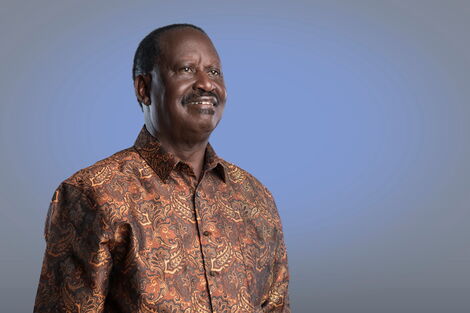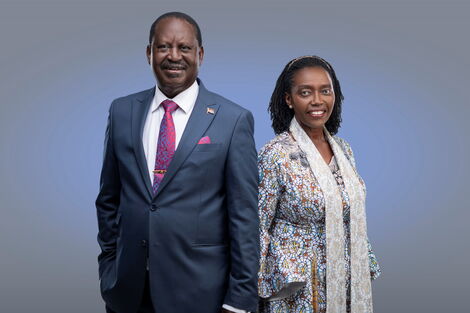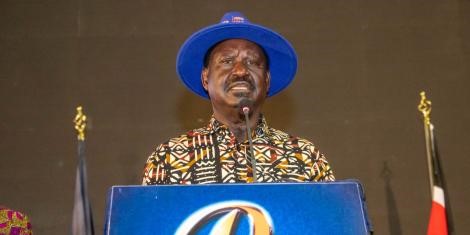-
Raila Odinga at KICC giving his speech to the Media about IEBC commission on August 16, 2022 KENYANS.CO.KE
-
On Tuesday, August 16, Azimio's Raila Odinga, rejected the presidential election results announced by Independent Electoral and Boundaries Commission (IEBC) chairperson Wafula Chebukati who declared DP William Ruto as the president-elect.
Raila pointed out discrepancies in the final tallying process- claiming that Chebukati disregarded the laws of the commission.
The former Prime Minister affirmed that they would exercise all available channels at their disposal to challenge the results.
 Azimio La Umoja One Kenya Coalition flagbearer Raila Odinga posing for a photo in a past eventKENYANS.CO.KE
Azimio La Umoja One Kenya Coalition flagbearer Raila Odinga posing for a photo in a past eventKENYANS.CO.KEHere is the full speech:
Today, I want to address my fellow Kenyans and the international community about the 2022 elections and the role of the IEBC - the body mandated by the constitution and the law to conduct and manage the elections.
On August 9, 2022, millions of Kenyans turned out in large numbers in an attempt to choose their leaders at the national, county, and local levels after a long and generally peaceful campaign.
But yesterday, on August 15, our budding democracy faced a major setback. As a result, Kenya faces a grave, legal and political crisis as a result of the actions of Mr. Wafula Chebukati, the chairperson of the IEBC. The constitution and our laws are clear about how the IEBC should conduct its business.
There is no more important role for the IEBC than the conduct, transmission and tallying of the presidential results. We are painfully aware of the past political biases by the IEBC that plunged this country into its darkest chapter.
The terrible memories of the aftermath of the 2007 General Election are still fresh in our minds.
In 2017, the Supreme Court of Kenya nullified the presidential election again because of misconduct of the IEBC. What we saw yesterday was a travesty and a blatant disregard of the constitution and the laws of Kenya by Chebukati and a minority of the IEBC commissioners.
The law is clear on the role of the chairperson of the IEBC. The law doesn't vest in the chairperson, the powers of a dictator to rule the IEBC unilaterally. The IEBC is a structured and democratic institution in which decisions must be taken either by consensus or by a vote of the majority.
The chairperson and a tiny minority of commissioners have no legal authority to take which decisions and proclaim them as the rulings of the IEBC. The law on the IEBC provides that unless a unanimous decision is reached, a decision on any matter before the commission shall be by a majority of the members present and voting.
I want to repeat that unless a unanimous decision is reached, a decision on any matter before the commission shall be the majority of the members present and voting. In addition, the Court of Appeal in the Maina Kiai case ruled and I quote again.
 From left; Azimio La Umoja One Kenya Coalition flagbearer Raila Odinga and his deputy Martha Karua posing for a photo in a past eventKENYANS.CO.KE
From left; Azimio La Umoja One Kenya Coalition flagbearer Raila Odinga and his deputy Martha Karua posing for a photo in a past eventKENYANS.CO.KE"We reiterate as we conclude that there is no doubt on the architecture of the laws we have considered that the people of Kenya did not intend to vest or concentrate such sweeping boundless powers in one individual that is the chairperson of the commission."
That is why I and Azimio la Umoja-One Kenya and the nation at large were shocked yesterday to learn that Chebukati alone decided to pronounce the supposed winner of the 2022 presidential elections. We understand that only Chebukati alone had access to the presidential tally votes. He denied all the commissioners access to that information until he suddenly appeared before the commissioners in the late afternoon, to present them with a fait accompli
Barely 2 hours before his announcement, he called a meeting of the IEBC and revealed to them the different results he was going to announce. Four of the seven protested but Mr. Chebukati, whose mind appeared made up, did not entertain any discussion of the results, precipitating a walkout the majority of the commissioners who promptly denounced the results at a press conference. We know what happened next.
A majority of the commissioners walked out and held a press conference where they denounced the results. Our view in Azimio is clear.
The figures announced by Chebukati are null and void and must be quashed by a court of law. In our view, there is neither a legally and validly declared winner nor a president-elect. Mr. Chebukati's announcement purporting to announce a winner is a nullity.
He acted with gross impunity and total disregard for the constitution and our laws. He could have plunged our country into chaos had our supporters not exercised great restraint. Such blunt acts of impunity can be a threat to the security of our country.
It is not up to us to decide whether Mr. Chebukati has committed an offense, we leave that determination to the appropriate authorities. For the avoidance of doubt, I want to repeat that we totally, and without reservation, reject the presidential results announced by Chebukati. I want to commend our supporters for remaining calm and keeping the peace and urge them to continue to do so.
Let no one take the law into their own hands. We're pursuing constitutional and lawful channels and processes to invalidate Chebukati's illegal and unconstitutional announcement. We are certain that justice will prevail. I want to further commend the heroism of the four commissioners who stood up to the bullying and illegal conduct of Chebukati.
We are proud of them and ask them not to fear anything, Kenyans are with them. Today, I did not want to fully address our strategies going forward but suffice it to note that we will be pursuing all constitutional and legal options available to us.
We will do so because we regard many flaws in the elections and the wrongs as fatal to the process and the outcome announced by Chebukati.
We urge Kenyans and friends and partners of Kenyans to stand tall and be counted as we seek to advance the ideals of democracy and open society that we always stood for. We will pursue justice for our supporters and for all Kenyans so that their choices are respected and honoured.
May God bless you and may God bless Kenya. By Brian Kimani, Kenyans.co.ke






